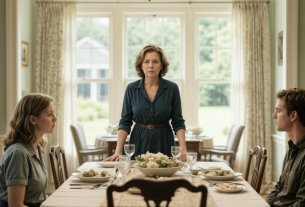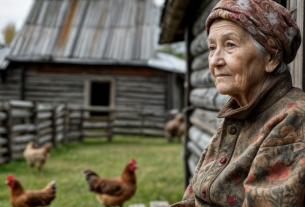An August evening wrapped the veranda in a warm haze. Nadya gave the table one last glance: the candles in their holders were still unlit, a bottle of Denis’s favorite wine sat beaded with condensation in an ice bucket, and on the platter lay his favorite snacks. A vase held fresh peonies, cut that morning from the garden bed. A light throw was casually draped over the back of the wicker chair — just in case the evening turned cooler.
The garden gate creaked. Nadezhda froze in anticipation, tucking a strand of hair behind her ear. When she saw her husband, she smiled — finally.
Denis climbed the steps to the veranda.
“I’ve missed you so much,” she whispered, stepping toward him as if to embrace him. But Denis drew back without a word. He walked past her and placed a laptop on the table.
“We need to separate,” he said calmly. “We’ll split the car and the business fifty-fifty. By law.”
Nadezhda froze, unable to believe her ears.
“What?..”
He opened the laptop and, without looking at her, continued:
“I’ve worked it all out. Here, look.”
She watched him click the mouse as if he were discussing not a divorce, but paying the internet bill. Nearby, on the table, were his favorite dishes, the sweating wine bottle, and the unlit candles. It all suddenly seemed meaningless.
“I don’t understand,” Nadezhda sank into a chair, feeling her knees weaken. “What do you mean ‘by law’? We’re… a family.”
Denis rubbed the bridge of his nose and looked away.
“We were a family. Now it’s just a formality.”
Snippets of memories whirled through Nadya’s head. They had met three years earlier at the wedding of her longtime friend. The banquet hall, decorated with fresh flowers, had been her pride — Nadya had stayed up all night perfecting each arrangement. Denis, hired as the photographer, barely left her side all evening, taking more pictures of her work than of the newlyweds.
“Photographing flowers like these is a joy,” he’d told her then, scrolling through the images on his camera’s small screen. “May I drop by your shop next week? I’d like to do a photoshoot for my portfolio.”
He arrived with coffee and pastries. He photographed bouquets, her hands at work, her smile. He spoke about creative projects, the freedom of self-expression, the importance of not getting stuck in corporate routine. Nadya had listened, spellbound. She had never met a man so passionate, so alive.
They married quickly — six months after meeting. They lived in her house, which she’d bought before knowing him. By then, her shop, Nadin Bouquet, was running steadily — a loyal clientele, a supplier base, two assistants.
Denis often came to her work with his camera, taking pictures for social media, filling the website.
“We built all this together,” he liked to say, hugging her after a big order. Though legally the business was hers, and Nadya handled the bulk of the work — orders, suppliers, accounting — herself.
Last year they bought a car — a small crossover she’d had her eye on for a long time. Almost all the money had been hers — profits from the shop and her savings.
“Denis, I don’t understand,” Nadya said, coming back to the present, looking at her husband bent over the laptop. “Why now? What happened?”
“Nothing happened,” he shrugged. “It’s just time. I want freedom — and my share of what we created together.”
She remembered the recent months: his constant “shoots,” the cancellations of their traditional Sunday lunches, the coldness in his responses to her kisses. She had blamed it on fatigue, a creative slump.
“Everything should be split fairly,” Denis added, turning the screen toward her to show some spreadsheet. “The car, the equipment, the clients… I invested my time. That’s my share of our joint work.”
Nadya looked at the peonies, already beginning to wilt in the vase, and could not speak.
A glass of mineral water had been sitting on the windowsill for three days. The house, usually immaculate, now mirrored her inner state — a disorder she had no strength to fix.
A week had passed since the conversation on the veranda. Denis had packed and left “to think.” Nadya hardly slept, replaying their life together, trying to see where she had gone wrong.
“Maybe I worked too much?” she whispered into the empty room. “Or maybe I didn’t value his creativity enough?”
Memories surfaced, ones she hadn’t paid attention to before: Denis snapping when she asked him to help with a large delivery — “I’m not a mover, I have a shoot!” — or refusing to go to her parents’ birthdays with flimsy excuses — “Your mother doesn’t get me, why should I go?”
Lately, all their conversations had revolved around him — his inspiration, his fatigue, his “complex artistic nature.” And she had listened, nodded, and tried not to get in the way.
At the café on the corner, Lena — her old university friend — was already waiting, the only person Nadya had told.
“I don’t understand,” Nadya stirred her coffee without looking up. “Maybe I really did ruin everything? He’s sensitive, and I’m all about schedules and plans…”
Lena silently pushed a second cup of coffee toward her, along with Nadya’s favorite pastry.
“Nadya… I’m going to tell you what you need to hear, not what you want to hear.”
“Go on,” Nadya finally looked up.
“He was seen downtown. With some girl. They were holding hands, kissing.” Lena’s voice was quiet but firm. “He didn’t leave because he burned out — he left because he moved on. And he just wanted to take a piece of your life with him.”
Nadya froze. Her fork, poised over the pastry, hung in mid-air.
“Who saw?” she managed.
“Marina. Two days ago, near that photo studio on Lenina Street.”
Lena covered her cold hand with her own.
“He’s used to you carrying everything. Now he’s decided — if he’s leaving, he’ll take something with him.”
Something clicked inside Nadya. The pain receded, replaced by cold clarity. She saw the truth at last: everything he called “ours” was her work. Her money. Her decisions. He had just stood nearby with a camera, catching angles — and someone else’s success.
“You know,” she said in an unexpectedly calm voice, “the business is registered only to me. And the car — on my father, at my mother’s insistence. I’ve just been driving it with a power of attorney.”
“Good girl,” Lena smiled.
In the lawyer’s office, Nadya sat with her hands folded in her lap. The trembling that had haunted her was gone.
Denis arrived fifteen minutes late, carrying a thick folder. Beside him was his friend Viktor — an economist, “for consultation.”
“So,” Denis began briskly, spreading papers on the table, “first, half of last year’s shop revenue. Second, fifty percent of the car’s value. And compensation for my creative contribution — photography, website design, promotion.”
Nadya calmly opened her own folder and slid documents to the lawyer.
“The Nadin Bouquet flower shop was registered as an LLC two years before we met,” she said firmly. “The legal entity is in my name. Here are the founding documents.”
She laid them out methodically.
“The car is registered to my father. Here’s the paperwork. All supplier contracts, receipts, purchases — my signature only. Denis has never been employed by the shop, never received a salary, never invested funds.”
Denis’s confidence drained as he stared at the documents.
“This… this is low,” he snapped. “I worked too! I contributed! My time, my ideas!”
“Unfortunately,” the lawyer interjected, “time and ideas are hard to value materially without formal agreements.”
“Nadya,” Denis’s tone shifted to pleading, “remember how we loved each other? Evenings on the veranda? Our plans?”
She met his eyes. Once, that tone would have made her doubt, feel guilty. But now she saw a stranger trying to manipulate her.
“I remember everything,” she replied. “That’s exactly why we’re here.”
The flowers arrived unexpectedly — a huge bouquet of pink peonies tied with a pale blue ribbon. “Forgive me. D.” read the card. She placed them on the counter, but an hour later moved them to the back room.
Her phone buzzed with messages:
“I realize everything now. Let’s start over. No lawyers. What we had was real.”
“Please, Nadya, let’s just meet and talk like people.”
“I was a fool. You’re the best thing that ever happened to me.”
The last one came late at night as she was arranging new displays in the shop:
“Remember our first New Year? That snowstorm? I can be that guy again — the one who brought you hot chocolate in bed. Give me a chance.”
She reread the words, sitting in the dim shop. Her fingers hovered over the keyboard. Something stirred inside her — not feelings, but memories of when they had seemed like a team.
Lena knocked and stepped in without waiting.
“You’re not answering calls. I was worried.”
Nadya showed her the phone.
“And? What do you think?” Lena asked.
“I don’t know… maybe people change?” Nadya said uncertainly.
Lena took her hand.
“He came back when he realized he’d get nothing. You’re not going to forgive that little fling, are you?”
In that moment, something clicked again. The last puzzle piece slid into place.
Nadya stood and turned off the light in the back room.
“You know, I just realized… All this time, I wasn’t afraid of losing Denis. I was afraid of losing the idea of us — as a team, a family. But that’s been gone for a long time.”
She blocked his number and, for the first time in weeks, smiled genuinely.
“Let’s go to my place. I’ve got a bottle of wine. We’ll have a glass.”
The pain was gone. Only clarity remained. And a very quiet, calm no more.
The registry office waiting room was cool. Nadya reread the documents, tracing the lines with her finger. Denis shifted from foot to foot, glancing at his watch.
“Maybe we should talk again?” he whispered. “We’ve been together for years. We started everything together.”
Nadya looked up from the papers. In his eyes was hope — not for reconciliation, but for a better deal.
“No,” she shook her head. “I started. You were just there. And then you betrayed me.”
Denis froze, his face shifting from confidence to the realization he’d been exposed.
“You know…”
“Yes. I know. You can’t hide a needle in a sack,” she said, handing him a pen. “Sign.”
His fingers hesitated, but after a moment he signed without a word.
“Leave the house keys on the table when you pack your things,” she said, gathering the papers.
He nodded and walked toward the exit. At the door, he turned as if to speak, then thought better of it. The door clicked shut.
Nadya exhaled deeply. For the first time in many weeks, the weight lifted from her shoulders.
The mirrored windows of Nadin Bouquet’s second shop gleamed in the evening light. Inside, amid flower arrangements and holiday garlands, friends, partners, and staff gathered to celebrate the business’s fifth anniversary.
In a simple, elegant dress, Nadya accepted congratulations. From Lena she learned that Denis was now working as a photographer in a shopping mall. The other woman had left him once she realized there was nothing behind the pretty words.
“They’re asking for your secret to success,” the administrator whispered, bringing over a local journalist.
Nadya thought for a moment.
“Maybe it’s simple,” she said. “Do what you truly love. And surround yourself with people who don’t drag you down.”
She noticed a dark-haired man in a tailored suit with an attentive gaze standing in the corner. Lena brought him over.
“This is Sergey, assistant to our supplier from Holland.”
“I’m impressed with your work,” he said, offering his hand. “Perhaps we could discuss collaboration over coffee?”
Nadya smiled, her eyes sparkling.
“Only if you’re not a photographer.”
Sergey laughed, not getting the joke but sensing her lightness. Nadya looked around the hall, filled with the results of her work and people who genuinely valued her.
She was free. Calm. And happy.



